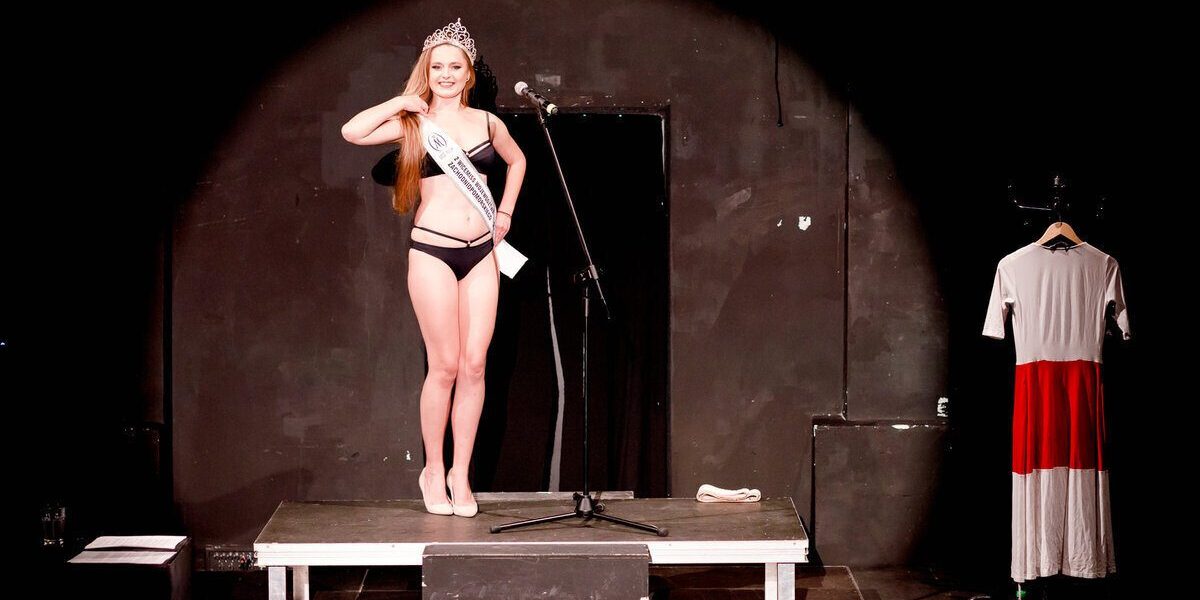The scene is set. We are attending a stand-up performance by Belarusian activist and artist Jana Shostak.
We are screaming for Belarus; we are sharing a global scream.
Often, when someone sees a beauty pageant contestant, the mind instantly labels the event as the opposite of feminism. As Jana says herself, women as ‘exhibitionist animal[s]’. This is first and foremost a perception problem. Whilst beauty standards are antiquated, the pageant can also present an unexpected political platform for those prepared to use it.
Consider my shock therefore when this Belarusian activist and artist struts onto the stage in underwear and a pageant crown, complete with the makeup to fit. There is a moment of exhibitionism, of vulnerability, then coupled with satirical lampooning of the political agenda. Removing the makeup between acts, Jana strips away the performance as we move further and further away from the comedic packaging of Jana’s activism.
How are any of us meant to talk about things that emotionally cannot be defined or understood through language? Is there one medium that is better than the other? Or is the plight of the individual to use mediums in search of an expression that can come as close enough or, perhaps, purposefully land too far away. Jana Shostak’s Stand Up (for your rights) discusses the black protests with the device of black comedy.
In August 2020, Alexander Lukashenko was re-elected in Belarus following a highly contested election process. Jana, who has lived in Poland since she was 11, returned to Belarus in the hope of witnessing the liberation of her country. Instead, what followed was protesting in fear and rejection of the imposed Communist regime. Today, patriotism is a crime. Belarusian pride is synonymous with attacks on the government. It is a criminal offense to love your homeland or to even say ‘long live Belarus’.
Humour is a funny device – both literally and metaphorically. Does it help us rationalise things that seem too abstract? Does it make reality a sweeter pill to swallow? I cannot give the answer to this, but what I can say is that, under the flag of Belarusian activism, it permits distance. Jana describes how comedy is a vehicle to our own inner perspective, allowing herself and her comrades to more widely communicate than if they were to speak plainly. It also helps us to understand the incomprehensible: in Gomel, Kristina Malashevich was sentenced to 15 days in jail for wearing white, red and white socks; in Vitebsk, Iraidza Misko (75 years old) was fined $205 and had her computer confiscated for distributing white, red and white sweets; in Minsk, Pawel was sentenced to 12 days in jail for hanging up the flag of England. Comedy is often found through the absurd. But, when you take a step back and really think about the nature of these prosecutions, the underlying oppression and torment cannot be hidden by trivialisation.
It is at this point that the Stand Up takes a turn away from comedy and moves into the serious. Through telling the story of Raman Bondarenko, a graduate of the Academy of Fine Arts who was beaten to death by the OMON for defending the white, red and white, Jana Shostak transitions into a more targeted political message.
For the duration of her performance, her white, red and white dress hangs up in the background. This is of course when she’s not wearing it and, as the papers like to place most emphasis on, when she’s not wearing a bra. The trivialisation of female activists, the undermining of their words and the use of sexuality to distract from the message is a struggle that many like Jana have had to face. This is also a struggle felt in countries like our own.
What is most interesting about the meeting of art and activism is where the line can be drawn between performance and reality. Theatre is often a mode of accessibility and expression for realities otherwise too challenging to communicate. Whilst Jana was relaying her story, she was also performing.
I watched this performance given in Polish, with an English script in hand. I was grateful for this. The emotions defied the language barrier, just as a scream is not country specific. I could understand the emotion and when it was appropriate to clap, I wanted to be able to show my solidarity. Solidarity is, after all, the only thing a community can rely on.
I can understand the global scream and believe many more people, beyond Eastern European, should partake in raising their voices as Jana Shostak does today.

